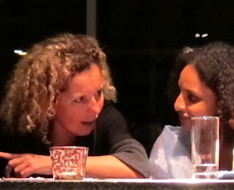Are you looking at me?
Two women go into a bar. They buy a drink, then sit talking to each other. [Spoiler: this isn’t going to be a joke. Please don’t expect an off-colour punchline: disappointment will be inevitable. This is in fact the first post in a series of three designed to investigate the terrible lies we tell, to ourselves and others, whenever we talk to or look at another human being. Anyway. Enough of this aside. As you were.]
As they talk, they do other things too. People do, while they talk, right? In fact sometimes when I am talking to someone I consciously remember that while talking we also do other things, and become self-conscious about what it is that I and other people do. I end up staring at them too long in the eye, until we are both uncomfortable. Then I flick my eyes to the corner of the room, but quickly back, so the other person won’t think I’m bored.
Now what, I think, panicking, as I listen, or say some drivel. Should I look at their ear? That would be weird, but better than lips, which would be flirtatious. Body: out of the question, for the same reason. Maybe it is time for a gesture, a folding of the hands, or an entire change in posture. Cross your legs! Uncross them. What is the other person doing? No, don’t look at their legs… ah, too late…
Given that these are the perils into which I fall in real life, you can imagine that when describing two people talking in a book, and worrying about where each of them is looking and what they are doing while they talk, the issue is twice as thorny. I notice it as a reader, too, and especially when watching TV. You see two people talking, sitting, looking at each other. But TV hates that, it wants movement. So suddenly one of them gets up, goes to make tea. Why then, I think? Is that a natural point to go and make tea? Worse, has the writer artificially manoeuvred the entire conversation around so that it builds up to a tea-moment simply in order to allow his character to move?
And if you are outside, say, on a walk, and there is no convenient kettle to hand, what then? As a writer, how do you accurately reflect the dozens of small looks and gestures, all of which from time to time reflect the internal maelstrom of self-consciousness that two people feel when they forget how to do conversation naturally and start trying to think their way through it?
In the end I reckon that all you can hope to do is to sketch enough of the moves, and show enough of the anxiety and feeling, that people get a sense of the reality of these characters talking, without overdoing it and having them stand up, sit down, shrug, nod and shake their heads so much that that they seem like hyperactive marionettes.
Most especially, you can try to avoid excessive looking. The thing is, as conversationalists, we largely look. That is what we consciously do. While our bodies express all sorts of things subconsciously, what a person chooses to do is look at someone, or look away, or look at their hands, or look up and sigh and look back again.
When I read first drafts, I find that characters look more than they do anything else. I see the word ‘look’ so often it stops looking like a word and it looks like a pair of binoculars stuck between two upright poles. Great, staring eyes, staring avidly at the world, hungrily sucking in every other action and gesture until characters are reduced to vast eyeballs, swivelling and rotating in each others’ direction.
And that is about the point I realise it is time for a break, and preferably tea or alcohol or in the case of emergency both. I look at my watch, then I look at the damn door, then I look at the kettle and I look for a mug and I look for a bottle of wine – and so it goes on. Look! Escape is futile…
This blog will be published weekly or thereabouts. Explore the links above for more about Will le Fleming and his writing.

 Will le Fleming is a novelist. His debut, Central Reservation, is published by Xelsion and
Will le Fleming is a novelist. His debut, Central Reservation, is published by Xelsion and 


Leave a Reply